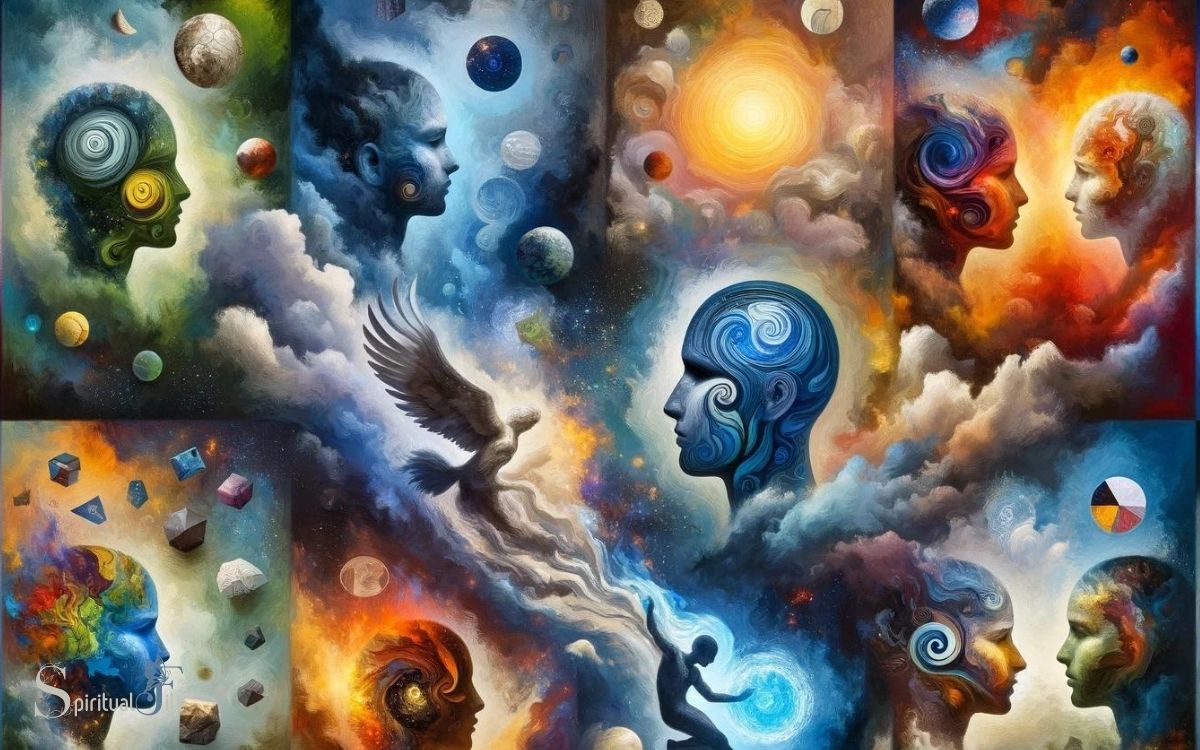Myers Briggs Personality Types and Spirituality: MBTI!
The Myers-Briggs Type Indicator (MBTI) identifies 16 personality types based on preferences in how individuals perceive the world and make decisions. Each type is denoted by a four-letter code, representing different aspects of personality.
Spirituality can resonate with each MBTI type in unique ways, as individuals draw on their cognitive functions to explore transcendent experiences, personal values, and life’s greater meaning.
The MBTI is used in a variety of settings, including personal development, career counseling, and relationship advice.
Concerning spirituality:
For example, an INFJ might be inclined towards a spiritual path that emphasizes humanitarian values and mysticism, while an ESTJ might resonate with organized religion and community service.

Key Takeaway
Exploring the Four Dichotomies
I’ll begin by examining the first dichotomy, which is the contrast between extraversion and introversion. This aspect of the Myers-Briggs Type Indicator (MBTI) focuses on how individuals gain energy and interact with the world.
Extraverts tend to be outgoing, sociable, and energized by being around others, while introverts are more reserved, introspective, and recharge by spending time alone.
Understanding this dimension can help us appreciate the diverse ways people engage with the world around them. It’s not about labeling or limiting individuals, but rather gaining insight into the spectrum of human behavior and preferences.
Embracing these differences can lead to better communication, collaboration, and empathy in our personal and professional relationships.
By recognizing and respecting these varying tendencies, we can create environments that honor and support everyone’s unique contributions.
Understanding Personality Functions
First, let’s delve into the four personality functions that make up the Myers-Briggs Type Indicator (MBTI), shedding light on how individuals perceive and process information, make decisions, and interact with the world.
- Perceiving Functions
- Sensing (S) – Focusing on concrete information and details.
- Intuition (N) – Emphasizing patterns, possibilities, and future implications.
- Judging Functions
- Thinking (T) – Making decisions based on logic and objective analysis.
- Feeling (F) – Making decisions considering values and the impact on people.
- Interaction Functions
- Extraversion (E) – Drawing energy from external experiences and interactions.
- Introversion (I) – Drawing energy from internal reflection and solitude.
Understanding these fun
Spirituality and Extraversion Vs. Introversion
How does spirituality relate to extraversion and introversion in Myers-Briggs personality types? The connection between spirituality and extraversion or introversion lies in how individuals engage with their spiritual beliefs and practices.
For extraverts, spirituality may be expressed through communal activities, such as group meditation or religious gatherings.
Where social interaction enhances their spiritual experience. On the other hand, introverts may find spiritual fulfillment in solitary practices like personal reflection, prayer, or mindfulness.
Both extraverts and introverts can experience deep spirituality, but the path to that experience may look different based on their personality preferences.
Understanding and respecting these differences can lead to a more inclusive and supportive spiritual community, where individuals of all personality types feel valued and understood in their spiritual pursuits.
Sensing, Intuition, and Spiritual Perception
When it comes to spirituality, our personality type can influence how we perceive and connect with the divine. Intuition may lead to spiritual insight, allowing us to perceive deeper meanings and connections beyond the physical realm.
On the other hand, sensing can facilitate a more grounded and tangible experience of divine connection, focusing on the present moment and physical sensations.
Intuition and Spiritual Insight
Interestingly, I frequently find that my intuition plays a significant role in my spiritual insights and perceptions. It’s as if there’s an inner knowing that guides me towards deeper understanding.
Here’s how intuition intertwines with my spiritual experiences:
- Deep Understanding: Intuition often provides me with a profound sense of understanding about spiritual matters that goes beyond logical reasoning.
- Connection to Higher Realms: My intuition acts as a bridge, connecting me to higher realms of awareness and spiritual truths that may be difficult to grasp through sensory experiences alone.
- Guidance and Discernment: Intuition serves as a valuable tool for discerning spiritual truths and guidance, helping me navigate my spiritual journey with clarity and insight.
This interconnectedness between intuition and spiritual insight has profoundly shaped my understanding of spirituality.
Sensing and Divine Connection
One significant aspect of my spiritual experiences is the role of sensing in establishing a divine connection. Through sensing, I find that I am able to connect with the divine in a tangible and concrete way.
It’s as if my senses become heightened, allowing me to perceive the presence of something greater than myself.
This heightened awareness enables me to experience the sacred in everyday moments, whether it’s through the beauty of nature, the warmth of a kind gesture, or the resonance of meaningful words.
Sensing opens my heart to the subtle yet profound ways in which the divine communicates with me. It’s a grounding experience that helps me feel rooted in the spiritual realm, fostering a deep sense of connection and purpose.
Thinking, Feeling, and Faith
When it comes to spirituality, my thinking or feeling preferences can significantly impact how I approach faith. Rationality and spirituality can intertwine, influencing the way I perceive and engage with religious beliefs.
Additionally, understanding emotional intelligence in the context of faith can provide insight into how my values align with my spiritual beliefs.
Rationality and Spirituality Connection
How do thinking, feeling, and faith intersect in the context of spirituality for different Myers Briggs personality types? It’s fascinating to consider how our rationality and spirituality are connected.
Here’s how these elements come together for various personality types:
- Thinking Types: They may approach spirituality through logical analysis and philosophical inquiry, seeking to understand the principles behind their beliefs.
- Feeling Types: They often connect with spirituality through emotional experiences, empathy, and a desire for harmony and connectedness in their faith.
- Faith-Centered Types: For these individuals, spirituality is deeply rooted in their beliefs, values, and personal convictions, often guiding their decisions and actions.
Understanding how thinking, feeling, and faith intertwine can provide valuable insight into how individuals approach and experience spirituality.
As we delve into the emotional intelligence aspect of faith, it becomes evident that our feelings and spirituality are intricately linked.
Emotional Intelligence in Faith
In exploring emotional intelligence in faith, I find that the intersection of thinking, feeling, and faith provides a rich understanding of how individuals engage spiritually. It’s important to recognize the role of emotions in shaping our spiritual experiences and relationships.
Here’s a table to illustrate the connection between emotional intelligence and faith:
| Emotional Intelligence in Faith | Description |
|---|---|
| Self-awareness | Understanding one’s own beliefs and values |
| Empathy | Compassion for others’ spiritual journeys |
| Emotional regulation | Managing emotions in the context of faith |
| Social skills | Nurturing supportive and inclusive spiritual communities |
Understanding and developing emotional intelligence within the context of faith can lead to a deeper, more empathetic, and fulfilling spiritual life.
Values and Religious Beliefs
Why are values and religious beliefs integral to my spiritual journey?
- Guidance: My values and religious beliefs provide a moral compass, guiding my actions and decisions in alignment with my spiritual path.
- Community: They connect me with a community that shares similar values and beliefs, offering support, understanding, and a sense of belonging.
- Meaning: They give meaning and purpose to my experiences, helping me make sense of the world and providing a framework for understanding life’s highs and lows.
Understanding the interplay between values, religious beliefs, and spirituality allows us to navigate our spiritual journeys more intentionally, fostering a deeper connection with our inner selves and the world around us.
As we explore the impact of values and beliefs on our spiritual paths, it’s essential to consider how our judging and perceiving functions influence our spiritual practices.
Judging and Perceiving in Spiritual Practices
As a Judging personality type, my approach to spiritual practices is structured and organized, while someone with a Perceiving personality type may engage in a more flexible and adaptable manner.
Here’s a comparison of how these different personality types may approach spiritual practices:
| Judging Personality Type | Perceiving Personality Type |
|---|---|
| Prefers structured and planned spiritual routines | Adapts to spiritual practices as they unfold |
| Enjoys setting goals for spiritual growth | Embraces spontaneity in spiritual exploration |
| Thrives on organized rituals and ceremonies | Appreciates the freedom to explore various spiritual paths |
Understanding these differences can help individuals tailor their spiritual practices to align with their personality type, leading to a more fulfilling and harmonious spiritual journey.
Embracing Wholeness: Integration of Personality and Spirituality
Embracing wholeness through the integration of personality and spirituality is a transformative journey that invites a deeper understanding of oneself and the interconnectedness of the inner and outer worlds.
It involves recognizing and accepting the different facets of our personality and how they contribute to our spiritual experiences. This integration fosters a sense of harmony and alignment within ourselves, leading to a more fulfilling spiritual life.
Embracing wholeness also requires acknowledging and embracing the shadow aspects of our personality, as they hold valuable lessons for our spiritual growth.
Furthermore, it involves finding ways to express our spirituality in alignment with our unique personality traits, allowing for an authentic and integrated spiritual experience.
Finally, it entails seeking balance and integration between our spiritual practices and our everyday lives, bridging the gap between the two.
Conclusion
Understanding my Myers Briggs personality type has helped me see how it intersects with my spirituality. It’s been an eye-opening journey to see how my extraversion, intuition, feeling, and perception play a role in my spiritual practices.
Embracing wholeness and integrating my personality with my spirituality has brought me a sense of peace and purpose. It’s like finding the missing piece of the puzzle in my spiritual journey, and it feels absolutely amazing.






